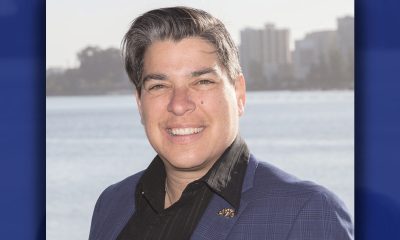Featured
AIDS and Aging
In the world of HIV prevention, persons over the age of 50 have been considered an invisible population. Sept. 18 is National HIV/AIDS Aging Awareness day, a time when HIV/AIDS workers focus on the unmet needs of the more than 1.1 million people living with HIV in the United States.
By 2015 it is predicted that half of those living with HIV in the country will be 50 years or older. However, few prevention campaigns have focused their messages on older adults and their concerns.
As a greater proportion of older individuals live with HIV infection, a greater proportion of new infections will also occur in this age group. Healthcare must begin to prepare now to care for these individuals, who are likely to experience a greater burden of disease from HIV infection, toxicity from HIV treatment and other co-occurring HIV and aging-associated conditions.
“I am one of the lucky survivors who has benefited from great successes with HIV care and treatment,” said Matt Sharp, who was diagnosed with HIV in 1988.
Sharp has a long history of advocacy for AIDS treatment and currently is the Director of Treatment and Education for Project Inform. Project, a San Francisco-based organization known for its advocacy and education around HIV/AIDS and Hepatitis.
“The fact that people with HIV are living into their 50s, 60s, and 70s is testament to the amazing success of HIV treatment,” said Sharp.
HIV positive elders face the same challenges of aging as anyone else. In addition, they confront unique barriers, such as stigma. With aging comes pressure from a perceived role in the family and can lead to feelings of shame in discussing their status around family members, thus ending up with no family support.
Other challenges are lack of knowledge of agencies and available services, and embarrassment to enter a place associated with HIV/AIDS. Physical disabilities and limitations also become a factor in accessing care, as people age.
For older adults, many of the risk factors for HIV infection are the same as those for younger persons. Many who are not infected, especially those resuming sexual relations after a divorce or the death of a partner, may not perceive themselves as at risk for HIV and may not take preventive measures such as using condoms or getting tested for HIV.
Some older persons may be less knowledgeable about HIV/AIDS and therefore less likely to protect themselves. Older people who are infected with HIV can spread the disease to their sex partners.
In addition, older women may be at higher risk for HIV infection because of age related vaginal thinning and dryness that can lead to tears in the vaginal area.
After being in a monogamous relationship, some older women find it awkward to initiate discussions about potential risk and preventive measures such as condom use. Some older persons inject drugs or smoke crack cocaine, which can contribute to risky behavior.
Health care professionals may not consider discussing HIV/AIDS with older patients and thus may miss opportunities to deliver prevention messages, offer HIV testing, or make an early diagnosis that could help their patients get early care.
Healthcare professionals may misdiagnose HIV infection symptoms in aging persons because some of the HIV symptoms can mimic those of normal aging, for example fatigue, weight loss and mental confusion.
African Americans have a high incidence of receiving a late HIV diagnosis. In older African Americans, their immunological response to treatment may be less than of a younger person, because aging affects the immune system.
The aging population affected and infected by HIV/AIDS must not be left out and forgotten, nor be denied the right to age with dignity, respect, and the highest quality of care.
HIV care and prevention must now become a part of aging in America.
Activism
‘Jim Crow Was and Remains Real in Alameda County (and) It Is What We Are Challenging and Trying to Fix Every Day,’ Says D.A. Pamela Price
“The legacy of Jim Crow is not just a legacy in Alameda County. It’s real. It is what is happening and how (the system is) operating, and that is what we are challenging and trying to fix every day,” said D.A. Price, speaking to the Oakland Post by telephone for over an hour last Saturday. “Racial disparities in this county have never been effectively eliminated, and we are applying and training our lawyers on the (state’s) Racial Justice Act, and we’re implementing it in Alameda County every day,” she said.

By Ken Epstein
Part One
Alameda County District Attorney Pamela Price gave an exclusive in-depth interview, speaking with the Oakland Post about the continuing legacy of Jim Crow injustice that she is working to overturn and her major achievements, including:
- restoring and expanding services for victims of crime,
- finding funding for an alternative to incarceration and/or prosecution for substance use and mental health-related misdemeanors and
- aggressively prosecuting corporations for toxic pollution and consumer violations.
“The legacy of Jim Crow is not just a legacy in Alameda County. It’s real. It is what is happening and how (the system is) operating, and that is what we are challenging and trying to fix every day,” said D.A. Price, speaking to the Oakland Post by telephone for over an hour last Saturday.
“Racial disparities in this county have never been effectively eliminated, and we are applying and training our lawyers on the (state’s) Racial Justice Act, and we’re implementing it in Alameda County every day,” she said.
Passed by the State Legislature, this law “is an extremely helpful tool for us to address the racial disparities that continue to exist in our system,” she said.
(The law addresses) “the racial disparities that we find in our juvenile justice system, where 86% of all felony juvenile arrests in the county are Black or Brown children.
“We trained the entire workforce on the Racial Justice Act. We are creating a data system that will allow us to look at the trends and to clearly identify where racism has infected the process. We know that where law enforcement is still engaging in racial profiling and unfair targeting and arresting, we’re trying to make sure we’re catching that.”
Many people do not know much about the magnitude of Alameda County District Attorney’s job. Her office is a sprawling organization with 10 offices serving 1.6 million people living in 14 cities and six unincorporated areas, with a budget this year of about $104 million.
Asked about her major achievements since she took office last year, she is especially proud of the expanded and renewed victims’ services division in the DA’s Office, she said.
“We have expanded and reorganized the entire claims division so that we are now expediting as much as possible the benefits that victims are entitled to. Under my predecessor, they were having to wait anywhere, sometimes as long as a year, to 400 days to get benefits.
“Claims had been denied that should not have been denied. So, we’re helping people file appeals on claims that were denied under her tenure,” D.A. Price said.
“Under my predecessor, (the victims’ service office) was staffed by people who were not trained to provide trauma-informed services to victims, and yet they were the only people that the victims were in contact with. We immediately stopped that practice,” she continued.
“We had to expand the advocate workforce to include people who speak Hmong, the indigenous language of so many people in this county who are victims of crime.”
More African Americans advocates were hired because they represent the largest percentage of crime victims and we hired a transgender advocate and advocates who speak Cantonese and Mandarin. “The predominantly Chinese American community in Oakland was not being served by advocates who speak the language,” said D Price
“We reduced the lag time from the delivery of benefits to victims from 300 to 400 days down to less than 60 days.”
She increased victim advocacy by 38%, providing critical support to over 22,500 victims, a key component of community safety.
Other major achievements:
- She recently filed 12 felony charges against a man accused of multiple armed robberies, demonstrating her seriousness about prosecuting violent crimes
- In October, a jury delivered a guilty verdict in the double murder trial of former Alameda County Sheriff’s Deputy Devin Williams, showing DA Price’s commitment to holding law enforcement accountable.
- She recently charged a man and woman in unincorporated San Leandro with murder, felony unlawful firearm activity, and felony carrying a loaded firearm in public.
- A. Price’s office was awarded a $6 million grant by the state for its CARES Navigation Center diversion program. In partnership with the UnCuffed Project at a Seventh Day Adventist Church in Oakland, the program provides resources and referrals for services to residents as an alternative to incarceration and/or prosecution for substance use and mental health-related misdemeanors.
“This is the largest grant investment in the history of the Alameda County District Attorney’s Office,” said D.A. Price.
She explained that the program now has a mobile unit. “We have washers and dryers. We have a living room. We have a television. It’s a place where people can decompress, get themselves stabilized,” she said.
The project has “the ability to refer people to housing, to more long-term mental health services, to social services, and to assist them in other ways.”
- Her office joined in a $49 million statewide settlement with Kaiser Health Plan and Hospitals, resolving allegations that the healthcare provider unlawfully disposed of hazardous waste, medical waste, and protected health information. The settlement, which involved the state and a half dozen counties, resulted in Alameda County receiving $7 million for its residents.
- DA Price charged a former trucking company employee for embezzling over $4.3 million, showing her commitment to tackling white-collar crime.
- For the first time, Alameda County won a criminal grand jury indictment of a major corporation with two corporate officers that have been sources of pollution. “They had a record of settlements and pollution in this community, and they had a fire that constituted a grave danger,” she said.
Attorney Walter Riley contributed to this article.
Activism
‘Criminal Justice Reform Is the Signature Civil Rights Issue of Our Time,’ says D.A. Pamela Price
Speaking about the destructive impact of mass incarceration, Price asked people to consider “how many children have incarcerated parents, where the practice has always been to isolate and eliminate connections between people who are incarcerated and their children and their families and the community. So, when we bring people home, they have no more connection.”

“As long as our criminal justice system is stuck in the mentality and practices of the 1950s, our country is not going to move forward,” she said.
By Ken Epstein
Part Two
District Attorney Pamela Price, facing a recall that began before she took office in January 2023, explained in an exclusive interview with the Oakland Post how she came to dedicate her life to transforming a deeply flawed criminal justice system into one that provides equal justice and public safety for all and ends mass incarceration for African Americans and other working-class people.
She summarized her life experiences as someone who was “traumatized and radicalized” by Dr. King’s murder, joining the Civil Rights Movement full force, getting arrested when she was 13 years old in a civil rights demonstration, being tracked into the juvenile justice and the foster care systems, and making it as a foster kid from the streets of Cincinnati to Yale College.”
“I understand a lot of things about struggle, about sacrifice, about trauma and fortunately survived all of that, and as a survivor learned some important lessons, and I brought all of that with me into the law and have been able to become a civil rights attorney in Alameda County,” she said.
“That’s been the joy of my life; I’ve lived every lawyer’s dream,” she said.
“Years ago, when I first decided to run for district attorney, I realized that mass incarceration was so destabilizing to our communities,” she said.
She saw that the “criminal justice system has so many impacts on our community, the safety of our community, the stability of our community, the growth of our community, the direction of our community.”
“As long as our criminal justice system is stuck in the mentality and the practices of the 1950s … our society is going to be mired in discord, and we will not have social justice, racial justice, economic justice, none of the things that actually make our communities worth living in.”
Speaking about the destructive impact of mass incarceration, Price asked people to consider “how many children have incarcerated parents, where the practice has always been to isolate and eliminate connections between people who are incarcerated and their children and their families and the community. So, when we bring people home, they have no more connection.”
It is crucial to address the needs of “young people in the juvenile justice system when they are more likely and able to be rehabilitated and redirected,” she said. Young people are much more able to be rehabilitated before the age of 18, really before the age of 26, and before they end up in an adult prison.
D.A. Price’s predecessor, Nancy O’ Malley, joined the D.A.’s office in 1984, where she remained for 39 years. She was promoted to a leadership position after just six years in the office during the era of mass incarceration when there was an explosion of prison construction in California.
“Prosecutors like my predecessor were the ones who filled (those prisons) up. She became a leader in the office around 1990. And what is very important for the public to know is that prior to becoming the district attorney in 2009, she was the chief assistant district attorney for 10 years under Tom Orloff.
“O’Malley worked very closely, hand-in-hand with him for the period of time that included the illegal conduct or the unconstitutional exclusion of Jewish people and Black people from death penalty juries.”
Commenting on the recall campaign against her, she said that had not a handful of multimillionaires and billionaires “put millions of dollars into this, we would not be having this recall. It is not a grassroots movement. It’s a platinum movement.”
“People have no idea what the vision is for the next district attorney, or where the office will go if I am, in fact, recalled, she continued. “I’m just running against a billionaire,” who does not show his face in public, she said.
If they successfully paint Oakland as a failed city, then hedge fund billionaires and real estate developers can come in and buy up the property cheap, she said.
Though D.A. Price has been bombarded by a massive tsunami of lies, slanders, and misrepresentation, she remains strong and positive because she is a woman of faith, she said.
“I’ve been saved and guided by (a) higher power since I was 13 years old. So, I’m not a new person to faith, and I’m grounded in that,” she said.
Activism
Oakland Post: Week of October 30 – November 5, 2024
The printed Weekly Edition of the Oakland Post: Week of October 30 – November 5, 2024

To enlarge your view of this issue, use the slider, magnifying glass icon or full page icon in the lower right corner of the browser window. ![]()
-

 Alameda County5 days ago
Alameda County5 days agoAlameda County District Attorney Pamela Price Announces $7.5 Million Settlement Agreement with Walmart
-

 Activism3 weeks ago
Activism3 weeks agoCOMMENTARY: DA Price Has Done Nothing Wrong; Oppose Her Recall
-

 Activism2 weeks ago
Activism2 weeks agoOP-ED: Hydrogen’s Promise a Path to Cleaner Air and Jobs for Oakland
-

 Activism3 weeks ago
Activism3 weeks agoBarbara Lee, Other Leaders, Urge Voters to Say ‘No’ to Recalls of D.A. Pamela Price, Mayor Sheng Thao
-

 Community2 weeks ago
Community2 weeks agoTerry T. Backs Oakland Comedy Residency by Oakland’s Luenell at Jimmy Kimmel’s Comedy Club in Las Vegas
-

 Activism3 weeks ago
Activism3 weeks agoOakland Post: Week of October 9 – 15, 2024
-

 Business2 weeks ago
Business2 weeks agoStudy Confirms California’s $20/Hour Fast Food Wage Raises Pay Without Job Losses
-

 Bay Area2 weeks ago
Bay Area2 weeks ago2024 Local Elections: Q&A for Oakland Unified School Candidates, District 3
































































